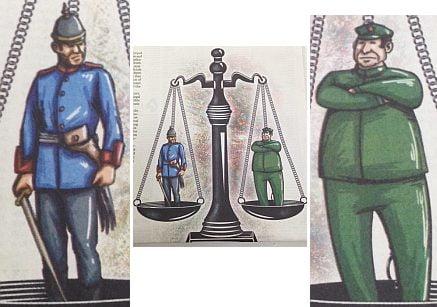Fearsome stuff in today’s South China Morning Post. Hong Kong needs to strengthen its anti-aircraft missile capacity – which, it has to be admitted, has been abysmally weak for as long as I can remember…
And the city must ‘reconcile’ its common-law system with China’s civil-law one…
In this column, Richard Wong notes that the continental European-style codified approach used in the Mainland ‘…works very badly in dictatorships, where it politicises justice and leads to socially inefficient outcomes…’. Hong Kong, he suggests, needs to ‘pay dues’ in return for having its separate English system. (Hosting anti-aircraft batteries presumably isn’t enough.)
The weirdest part is the accompanying artwork, which shows a set of scales balancing a fat Mao-suited Chinese Communist stereotype and a World War I German soldier in a creepy Prussian spiked helmet…
Germany does feature in the article as the root source of China’s first modern legal code (in the late 19th Century, when Qing reformers followed Japan’s example). But this doesn’t explain the peculiar illustration. It passes the sufficiently-bizarre-to-cut-out-and-keep test.
 In despair, I return to the neighbourhood nightmare that should by now be known as Hoarding-gate. It was in early-mid July, if I recall, that this wooden structure (right) appeared, consuming most of the narrow sidewalk and forcing people to walk in the road. The government’s idiotic Efficiency Unit laughably failed to do anything about it, and Dr Vienna, my friendly local crypto-United Front politician, similarly let me down. More recently, workers renovating the premises have also erected bamboo scaffolding around it, leaving pedestrians a fairly challenging 12-inch gap…
In despair, I return to the neighbourhood nightmare that should by now be known as Hoarding-gate. It was in early-mid July, if I recall, that this wooden structure (right) appeared, consuming most of the narrow sidewalk and forcing people to walk in the road. The government’s idiotic Efficiency Unit laughably failed to do anything about it, and Dr Vienna, my friendly local crypto-United Front politician, similarly let me down. More recently, workers renovating the premises have also erected bamboo scaffolding around it, leaving pedestrians a fairly challenging 12-inch gap…
However, the exciting news is that we have someone officially to blame: Cicada. There was a Cicada restaurant down the hill at some stage, and now for some reason it will be reborn here. I think it was one of those places that jumped on the ‘tapas’ bandwagon, offering the free snacks found in Spanish bars for the price of a regular meal. I wondered at the time why someone would name a restaurant after what is basically a noisy cockroach.
The new Cicada is looking for ‘cool, fun’ dish-washers. Desperate young Nepalese and Filipinos tossed aside by the Hong Kong education system can apply next door at Enoteca.
This brings even more memories back. Yes, it was exactly 10 years and 20 days ago that this establishment drew attention for having the name ‘acetone’ backwards. (Intriguingly, it survives.) It is hardly surprising that it is run by the same people behind the soon-to-reopen Cockroach. At least the hoarding will finally come down. The new restaurant will place a little stand on the sidewalk to hold a menu. And I will take great delight in telling tourists perusing it not to waste their money there but go to the daipaidong down the hill for something halfway authentic and value-for-money. This gets some of the tourist pestilence out of the area and reduces the overpriced themed eatery concept’s revenue – my idea of a win-win.




Next door to the old Cicada the same folks had (have ?) a place called Bacar, which I guess is short for Bacardi, also a tapas thing. But it’s not just a restaurant, it’s a lifestyle.
The key question still hangs in the air. Which is the true Heart of Darkness: Wutai Township or Soho?
1870 Franco-Prussian war era uniform, I’d say. Shame it’s missing a helmet plate….tut tut.
Sorry, but I’m the kind of chap who exasperates himself about war movies using the wrong type of tank. And those parachutes in ‘A bridge too far’ are 20 years too early as well…..
The symbolism is perfectly clear to pictorial exegetes. The thinnish, malicious, smirking, envious devil — doesn’t matter which country, they’re all the same — is clearly upper class (sword and revolver), and is balancing the benign, corpulent, grassroots, salt-of-the-earth human being, recently liberated from foreign shackles, hence his arousal.
Which just shows that the scales of justice don’t work: they need harmonising and localising, to help them blend in.
I think the illustration complements Professor Wrong’s article perfectly.
At first glance both seem to be full of meaning, but on closer inspection it turns out to be a meaningless series of non sequiturs, ultimately just pointlessly wasting space.
I read Wong’s article on-line, where, oddly, there is no mention of “reconciliation” of common and civil law. Nor did I interpret the article as being anything but a defence of common law, and pointing up how dangerous civil law can be when administered by the unscrupulous.
Perhaps the “paying the dues” idea was an unfortunate turn of phrase, but I saw the point he was making was that, back in the days of the negotiations with barons and kings, there was some give and take.
Diane, ‘Bacar’ is Indonesian for ‘garrulous’. Perhaps they are targeting the FDH crowd?
The Islands War, 2015
The casus belli was competing claims by China and the Philippines to some islands in the South China Sea. Although their navy was no match for the Chinese, Philippine strategists saw that the former colony of Hong Kong, almost bereft of air defences, was exposed to a well-planned attack. They were also aware of the large resident Filipina population whose compliant behaviour masked, in some cases, a seething desire for revenge.
Targets were carefully chosen: both racecourses, some economically significant shopping malls, including several in the northern New Territories, and all breweries and beer distributors except San Miguel. Hong Kong’s forces, dazed and disoriented, surrendered.
The Occupation was a remarkable period in Hong Kong’s history. Photographs circulated online showing former employers carrying their former maids’ shopping, keeping places in queues for their former maids, and getting up at six in the morning to clean their former maids’ husbands’ cars. On the other hand, Chinese and western ex-employers suffered equally, and close bonds grew between them which had not existed before. Reflecting the new power structure, many Filipina women married younger western men.
The Occupation ended when China accepted the Philippines’ sovereignty over the islands in perpetuity.
You have made many friends in the (in)Efficiency Unit, Building Dept, and probably a few other government “organs”. Every time you complain, they each have an excuse to go down againand shake the landlord or renter for extra retirement funds. The ICAC is grateful too, since a % must be kicked back to them, and then on up to Maria The Hut Tam & Lufsig. Money forgives all sins, particularly the sin of blogging.
What is it that makes these washed-up female political figures into ultra-reactionary, pro-China vixen ? Vagina Ip, Rita Fan, Maria Tam, Elsie Leung and, if she wasn’t so inconsequential, Pamela Pak probably too. Is it because they went without sex for so long ? I guess traitor-trash like Christine Loh (who is currently not getting any, as I understand it) and C.Lam Chowder (fishy smell) know what the future looks like…
@Knownot: Sorry to be such a bloody pedant, but Filipina is a noun. The adjective to describe either a male of female of Philippine nationality is Filipino, and the noun to decribe a Filipino male is also Filipino. My intention is to educate, not to criticise. All too many people are guilty of the same error.
Damn. That should read “male or female”.
@Laguna: Do not be so hard on yourself. A bloody pedant would be the kind of person who would ask you to define the word “decribe”.
what’s the censorship thing, ‘Hemmers’ ?
This blog is too good.
“Dr Vienna, my friendly local crypto-United Front politician…”
Thank you Hemmers for saving me the trouble of wading through Dr V’s detritus. oooh, big word of the day… off to wash my mouth out! What I meant to say, save me wading through Dr Vienna’s shite.
@Joe Blow – nice phrase, traitor-trash – I will seek opportunities to use it. Personally I have always referred to those who only discovered their abiding love for the motherland when a similar passion for the home of Magna Carta became a career obstacle as “sudden patriots”.
Thank-you, Knownot. A big fan of your poetry, I’m tickled by your “Islands War 2015” fantasy tale. Laguna Lurker is partially right saying “Filipina” is a noun, you were wrong to use the word as an adjective. “Filipina” is the noun denoting Philippine females. “Filipino” itself covers both genders & is also the term for Philippine males. Take it from this Pinay (female, as opposed to Pinoy for males). And don’t confuse names like those we call our insipid president who’s often referred to as PNoy (pronounced pee-noy), which derives from his nickname Noynoy, as distinguished from his late illustrious father Ninoy (both their Christian names were/are Benigno). Because we’re a childish playful people, we like to attach cute endings to names, many of which are PeeWee, Girly, Peachy, Boyet, Dingdong (a famous film star), Bikbik, etc. As our Tourism Dept touts: “It’s more fun in da Pilipins”!